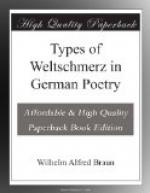But just as helpless as this defiant pride proved before his all-consuming love for Sophie, so strongly did it assert itself in all his other relations with men and things. A hasty word from one of his best friends could so deeply offend his spirit that, according to his own admission, all subsequent apologies were futile.[131] For Lenau, then, such an attitude of hero worship as that assumed by Hoelderlin towards Schiller, would have been an utter impossibility. We have already seen the extent to which he was over-awed (?) by Goethe’s views when they were at variance with their own.[132] On another occasion he writes: “Was Goethe ueber Ruysdael faselt, kannte ich bereits."[133] Toward his critics his bearing was that of haughty indifference: “Mag auch das Talent dieser Menschen,[TN1] mich zu insultieren, gross sein, mein Talent, sie zu verachten, ist auf alle Faelle groesser."[134] When his Fruehlingsalmanach of 1835 had been received with disfavor by the critics, he professed to be concerned only for his publisher: “Ich meinerseits habe auf Liebe und Dank nie gezaehlt bei meinen Bestrebungen."[135] “Die (Recensenten) wissen den Teufel von Poesie."[136] Whether this real or assumed nonchalance would have stood the test of literary disappointments such as Hoelderlin’s, it is needless to speculate.
Hoelderlin eagerly sought after happiness and contentment, but fortune eluded him at every turn. Lenau on the contrary thrust it from him with true ascetic spirit.
The mere thought of submitting to the ordinary process of negotiations and recommendations for a vacant professorship of Esthetics in Vienna is so repulsive to his pride, that the whole matter is at once allowed to drop, notwithstanding that he has been preparing for the place by diligent philosophical studies.[137] The asceticism with which he regarded life in general is expressed in a letter to Emilie Reinbeck, 1843, in which he says: “Wer die Welt gestalten helfen will, muss darauf verzichten, sie zu geniessen."[138] But more often this resignation becomes a defiant challenge: “Ich habe dem Leben gegenueber nun einmal meine Stellung genommen, es soll mich nicht hinunterkriegen. Dass mein Widerstand nicht der eines ruhigen Weisen ist, sondern viel Trotziges an sich hat, das liegt in meinen Temperament."[139]
Another characteristic difference between Lenau’s Weltschmerz and Hoelderlin’s lies in the fact that the writings of the latter do not exhibit that absolute and abject despair which marks Lenau’s lyrics. Typical for both poets are the lines addressed by each to a rose:
Ewig traegt im Mutterschosse,
Suesse Koenigin der Flur,
Dich und mich die stille,
grosse,
Allbelebende Natur.
Roeschen unser Schmuck veraltet,
Sturm entblaettert dich und
mich,
Doch der ew’ge Keim
entfaltet
Bald zu neuer Bluete sich![140]
Unmistakable as is the melancholy strain of these verses, they are not without a hopeful afterthought, in which the poet turns from self-contemplation to a view of a larger destiny. Not so in Lenau’s poem, “Welke Rosen”:




